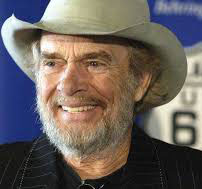
(Reuters) – Country musician Merle Haggard, who emerged from prison to become the poetic voice of the American working man with hits such as “Mama Tried” and “If We Make It Through December,” died on Wednesday, his 79th birthday, said manager Frank Mull.
Haggard died of pneumonia at his home in Palo Cedro, California, Mull said.
The country legend had canceled all his concerts for the month of April due to illness. His son Ben, who played lead guitar in Haggard’s band, said his father had predicted the day of his death.
“A week ago, Dad told us he was gonna pass on his birthday, and he wasn’t wrong,” Ben wrote on Facebook. “An hour ago he took his last breath surrounded by family and friends.”
Haggard became one of the most influential figures in country music with a repertoire that included songs with traditional country themes such as drinking and heartache, but he infused them with more insight and tenderness than most honky-tonkers. He also broadened the genre by writing about poverty, loneliness and social issues.
Haggard once said he preferred playing guitar to singing but it was his voice that made him stand out.
“Haggard’s exceptionally true intonation, his command of varied vocal textures and his insinuating phrasing would make him a superior vocalist in any idiom,” the New York Times said of Haggard in his prime. “Like Muddy Waters in the blues field and only a handful of other performers, he both embodies and transcends his rich American musical heritage.”
Haggard’s sound drew from traditional country but also touched on folk, pop, jazz, blues and rock, and his songs were covered by the likes of the Grateful Dead, Elvis Costello and Lynyrd Skynyrd.
“I can’t remember when I haven’t listened to him,” said Rolling Stones guitarist Keith Richards. “Some of the best songs and best delivery you can get.”
Haggard was born April 6, 1937, near Bakersfield, California, the son of a couple who had been part of the exodus from Oklahoma’s Dust Bowl during the Great Depression. Haggard’s father was a carpenter for a railroad, and the family lived in a converted boxcar.
Haggard, who was 9 years old when his father died of a brain tumor, quit school in the eighth grade and began hopping freight trains.
He also took up the guitar and petty crime and frequently was placed in – and escaped from – juvenile reformatories.
A few years later he was living out the lyrics of what would be one of his biggest hits – “Mama Tried,” the story of a man who marked his 21st birthday in prison. He had been sent to California’s notorious San Quentin prison for trying to break into a cafe – too drunk to realize that at the time it was still open and serving customers.
Haggard was already a big fan of country star Lefty Frizzell when he saw Johnny Cash perform at the prison in 1958 and decided to make a career of music after being paroled almost three years into his sentence.
“I would’ve become a lifetime criminal if music hadn’t saved my ass,” Haggard said in a PBS documentary. “I’m living proof that things go wrong in America and I’m also living proof that things can go right.”
During his time as governor of California, Ronald Reagan pardoned Haggard for his crime.
Haggard returned to his hometown in 1960 and, along with Buck Owens, helped define what became known as the “Bakersfield sound” – a more raw, twangy-er country sound than the highly produced music that was coming out of Nashville at the time.
The subject matter of the songs Haggard wrote was more blunt than some of his fans were accustomed to – “Irma Jackson” was about interracial romance – and he rebelled when record company executives wanted to change his style.
“I’ve never been a guy that can do what people told me,” he told the Times. “It’s always been my nature to fight the system.”
Hits such as “Workin’ Man Blues,” “Hungry Eyes” and “If We Make It Through December,” the plaintive story of a laid-off factory worker trying to salvage Christmas for his young daughter, were likened to the populist works of Woody Guthrie.
Haggard’s other hits included “Lonesome Fugitive,” “Silver Wings,” “Sing Me Back Home,” “Daddy Frank (The Guitar Man),” “The Bottle Let Me Down,” “The Fightin’ Side of Me,” “I Think I’ll Just Stay Here and Drink,” and “Pancho and Lefty,” a duet with Willie Nelson.
Haggard toured constantly with his band, the Strangers, and once described his life as “a 35-year bus ride” – and that was in 1996, long before his bus stopped rolling.
